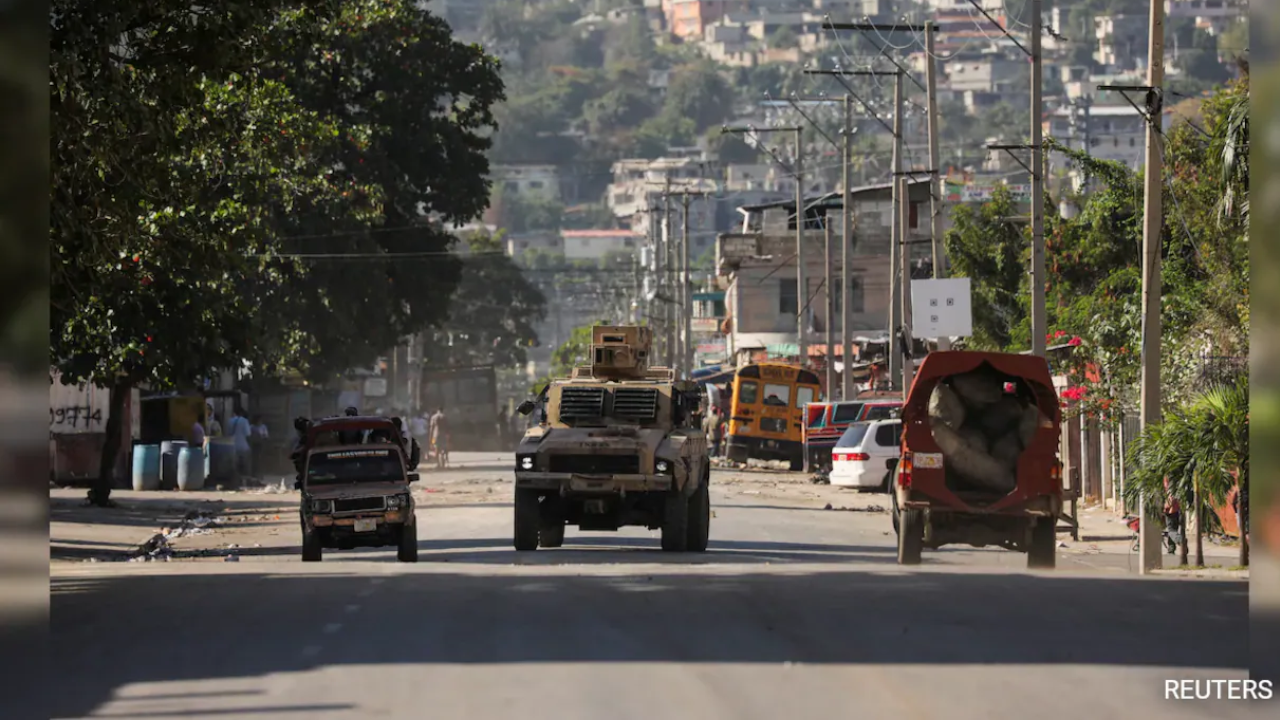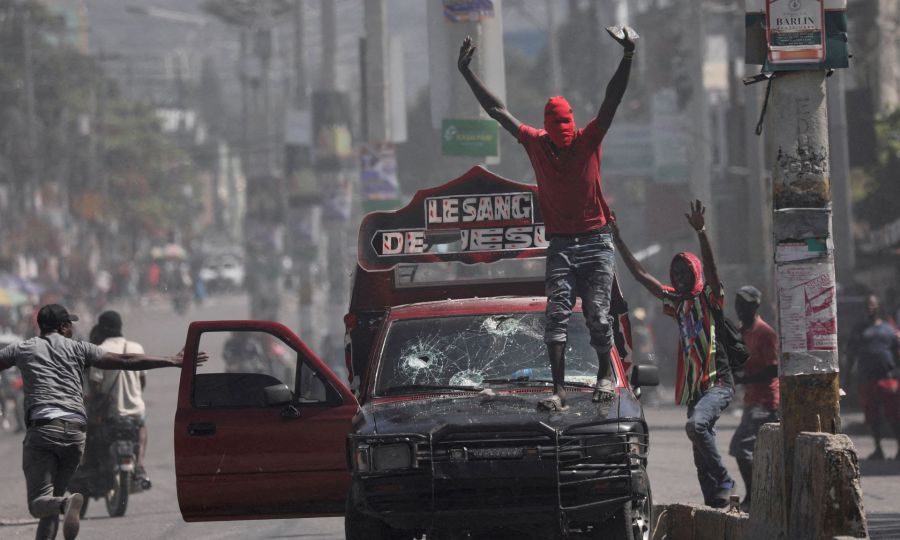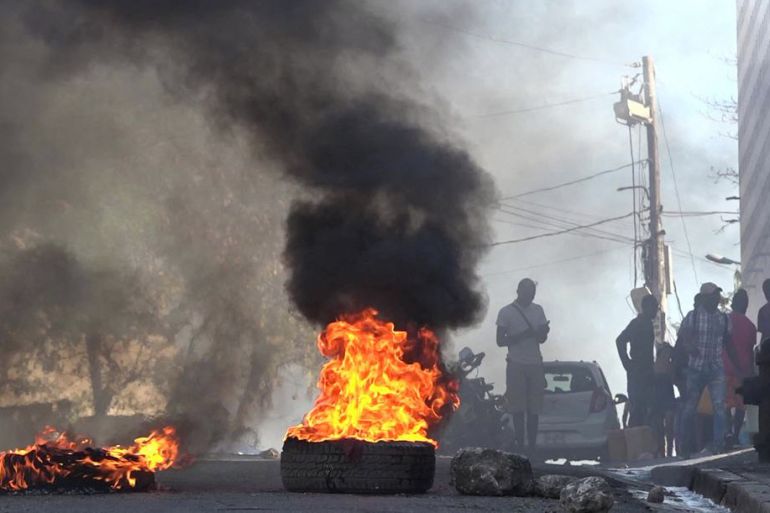Haiti has declared a state of emergency amid escalating violence after the Jail Break incident. The national crisis follows significant increases in gang activity.
The Caribbean nation of Haiti faces a dire security situation that has compelled the government to announce a state of emergency after an armed gang attacked a major prison and about 3,700 inmates escaped from the prison. Shockwaves through communities and international circles stem from the surge in violence, largely attributed to rampant gang warfare. Humanitarian concerns rise as clashes disrupt daily life and hinder aid efforts.
The crisis intensifies, drawing attention to the instability that plagues Haiti, a country already grappling with political turmoil and natural disasters. Declaring a state of emergency signifies a desperate measure to restore order and safety for Haitian citizens. This escalation of violence threatens the fragile economic and social fabric of the nation, stressing the urgent need for a comprehensive solution to Haiti’s ongoing security challenges.
/bnn/media/media_files/c79504076b2f9991cf1adf68f0a0e45ace4777c139c042497c142eeb0d7d7e8b.jpg)
Credit: bnnbreaking.com
Haiti’s Escalating Crisis
In a nation marked by complexity, Haiti faces a new threshold. Streets echo with turmoil as the country declares a state of emergency. The people of Haiti confront not just the echoes of past hardships, but a fresh wave of chaos. Political upheaval converges with security woes, threatening the fabric of daily life.
Political Instability Rises
Recent events signal a sharp uptick in political strife. Leadership tussles have opened vast power vacuums. Armed factions vie for control, igniting unrest across the nation. Aspirations for stability hang by a thread.
- Leadership battles escalate.
- Armed groups struggle for dominance.
- Uncertainty looms over Haiti.
Public Safety Concerns Intensify
The streets grow hazardous, fueling a surge in safety concerns. Citizens navigate a labyrinth of danger. From sporadic clashes to blatant lawlessness, the sense of security dwindles.
| Issue | Impact on Public Safety |
|---|---|
| Violent Outbursts | Increased risk in daily life. |
| Law Enforcement Challenges | Strained capacity to maintain order. |
| Civilian Dilemma | Compromised access to essential services and safety. |

Credit: www.timesnownews.com
State Of Emergency Declaration
In a bold move to curb the escalating violence, Haiti has enacted a state of emergency. This decree comes as a response to the surging criminal activities threatening the nation’s security. Civilians find themselves caught in a scenario demanding immediate government action. The following sections elaborate on the government’s stance and its effects on civil liberties.
Government’s Response
The Haitian government initiated crucial steps to address the crisis. Key measures include:
- Deployment of armed forces to restore peace and order.
- Curfew enforcement to limit street activity after dark.
- Establishing checkpoints to monitor movements.
These actions aim to dismantle violent factions and bring peace to communities. The country’s leadership promises swift and decisive action to safeguard its citizens.
Implications For Civil Liberties
Such emergencies often lead to the temporary suspension of certain freedoms. Civilians might experience:
- Restrictions on movement due to curfews and checkpoints.
- Limited access to information, with possible media blackouts.
This balance between security and liberty remains delicate, as the government must protect its people while respecting their rights.
Root Causes Of The Unrest
Gang Leaders are calling for Prime Minister Ariel Henry to step down, as his current location remains undisclosed following his trip to Kenya.
Approximately 80% of the capital city, Port-au-Prince, is under the control of gangs.
Haiti has been plagued by gang violence for many years.
According to an announcement from the government, two prisons—one in Port-au-Prince and another in the nearby area of Croix des Bouquets—were forcefully entered over the weekend.
Understanding the recent turbulence in Haiti starts by looking at its deep-seated issues. Several factors contribute to the current state of emergency. These factors, like old threads woven into the country’s fabric, pull at the stability of the nation.
Economic Hardships
At the forefront of Haiti’s unrest lie severe economic challenges. The country faces a high poverty rate. Many people struggle daily to meet their daily needs. Jobs are scarce. The cost of living keeps soaring. With such economic pressures, frustration among citizens escalates, leading to widespread anger and social unrest.
- High unemployment rates leave families in despair.
- Inflation pushes prices up, making food and healthcare less affordable.
- Haiti’s economy relies heavily on foreign aid, which is often insufficient or unstable.
Corruption And Impunity
Another core issue driving the unrest is corruption. Money meant for development often disappears. Government officials sometimes act without fear of consequences. This lack of accountability diminishes public trust. Impunity undermines efforts to build a fair society. Without trust in officials, citizens are quick to protest and express their grievances in the streets.
| Issue | Impact on Society |
|---|---|
| Mismanagement of funds | Lack of basic services and infrastructure |
| Illegal activities | Increased crime and insecurity |
| Political instability | Civil unrest and lack of effective governance |
Impact On The Population
The declaration of a state of emergency in Haiti comes after escalating violence and unrest. This situation has profound effects on the people living there. Their daily lives and well-being are now under severe strain as they navigate this turbulent period.
Disruptions To Daily Life
Lives in Haiti have turned upside down. Regular routines have stopped. Violence makes it hard for people to go out for work, school, or groceries. Look at some key disruptions:
- Closed shops and businesses make it hard to buy food and supplies.
- Schools shut down, forcing kids to miss valuable education.
- Public transport is risky or non-existent, limiting movement.
- Fear governs daily decisions; safety is a constant worry.
Humanitarian Situation Worsens
The violence has triggered a dire humanitarian crisis. People are in desperate need of help. See the issues they face:
| Healthcare | Shelter | Food Security |
|---|---|---|
| Hospitals are overwhelmed and undersupplied. | Many have lost their homes; they now live in unsafe conditions. | Families are struggling to find enough to eat. |
This crisis hits the vulnerable hardest. Children, the elderly, and the sick suffer the most. Immediate action is critical to prevent more suffering.
International Reactions
Haiti’s declaration of a state of emergency has captured the world’s attention. With violence on the rise, many countries and organizations are compelled to act. Let’s look at the stance the international community is taking in response to this critical situation.
Global Leaders Weigh In
Responses from global leaders have been swift and varied. Many express concern for the welfare of Haitian citizens and the region’s stability. As turmoil escalates, these leaders urge a peaceful resolution and emphasize the importance of safeguarding human rights.
- The United Nations has called for an immediate cessation of violence.
- The United States offers support for a democratic process.
- Canada stresses the need for humanitarian assistance.
- Leaders from the Caribbean Community (CARICOM) advocate for regional security.
Foreign Aid And Intervention
Foreign aid operations are being mobilized to offer relief to the impacted populations. Rescue missions and strategic intervention are in the pipeline.
| Country / Organization | Type of Aid |
|---|---|
| European Union | Emergency funds and humanitarian workers |
| United States | Security assistance and law enforcement training |
| United Nations | Peacekeeping operations and mediation efforts |
Non-governmental organizations (NGOs) are also active, providing medical aid, food supplies, and shelter to those in urgent need.

Credit: knews.kathimerini.com.cy
Historical Context
Haiti’s recent declaration of a state of emergency comes amid escalating violence. This turmoil isn’t sudden but deep-rooted in history. Understanding Haiti’s past helps explain today’s challenges. A tumultuous legacy and external forces have shaped Haiti’s destiny.
Legacy Of Instability
The seeds of instability were sown long ago. Since gaining independence in 1804, Haiti has faced continuous upheaval. Political turmoil has been a constant. Leaders come and go often. Coups, revolts, and uprisings mark Haiti’s timeline.
Several factors contribute to this legacy:
- Economic struggles: Debt and poverty hinder progress.
- Political fragmentation: Divide and conquer tactics weaken unity.
- Limited resources: Competition over scarce goods sparks conflict.
Foreign Influence And Past Interventions
Foreign powers have often stepped into Haiti. Their influence is undeniable. From early 20th-century occupations to recent aid interventions, outsiders have shaped Haiti.
Key points include:
- The US occupation from 1915 to 1934, reshaped Haiti’s infrastructure and politics.
- UN peacekeeping missions, attempting to stabilize the nation.
- Global aid efforts following natural disasters, bring both assistance and controversy.
Each intervention has left a mark. Some see these actions as beneficial, others as meddling. They all play a role in Haiti’s current state of emergency.
Moving Forward
The beautiful nation of Haiti is at a crossroads, facing unprecedented challenges but also an opportunity for profound change. The escalation of violence has led to a necessary state of emergency. Yet, even in such testing times, the resolve to move forward and seek stability remains strong.
Potential Paths To Stability
In times of turmoil, identifying strategies for peace and growth is critical. Here are immediate steps Haiti could consider:
- Dialogue: Open lines of communication between conflicting parties.
- International aid: Secure support for humanitarian relief and infrastructure.
- Police reform: Addresses corruption, training, and resources.
- Political consensus: Foster a shared vision of the future among leaders.
Adopting these measures can lay a foundation for lasting stability.
Role Of Civil Society
The heart of any nation lies with its people. Civil society organizations play a paramount role in recovery. Take a glance at their possible contributions:
- Empowerment: Educate and mobilize citizens to participate in governance.
- Advocacy: Campaign for policy changes and rights protections.
- Community support: Assist in rebuilding efforts and providing essential services.
- Watchdog: Monitor government actions to ensure transparency and accountability.
With active participation, civil society can steer Haiti towards a peaceful future.
Personal Stories
The streets of Haiti have become a canvas of despair, painting a vivid picture of the escalating violence that has gripped the nation. As the government declares a state of emergency, it isn’t just statistics and reports that convey the gravity of the situation—it’s the personal stories of those living this nightmare. The voices of Haitians echo through the turmoil, sharing their daily trials and terrors
Voices From The Ground
From the heart of the chaos, brave individuals step forward to share their experiences. Each story, a deeply personal narrative, shines a light on the harsh reality locals face amidst the unrest.
- Marie, a local teacher, recounts waking up to the sound of gunfire each morning.
- Pierre, a small business owner, speaks of the struggle to keep his store open.
- Jeanne, a nurse, describes the challenges of caring for the injured during this crisis.
Living Through The Turmoil
Life during a state of emergency is marked by uncertainty and fear. Haitians share their day-to-day experiences of trying to maintain some semblance of normalcy amidst the chaos.
| Name | Occupation | Daily Challenge |
|---|---|---|
| Luc | Farmer | Transporting produce to markets |
| Sophie | Student | Attending school in safe conditions |
| René | Doctor | Supplying clinics with necessary medical aid |
Analyzing The Economic Fallout
Haiti’s recent state of emergency reveals not only a surge in violence but also complex economic challenges. We must delve into the far-reaching effects this turmoil has brought on Haiti’s economic landscape. The following analysis explores how current events are reshaping trade dynamics and investment prospects, directly impacting the future of Haiti’s economy.
Impact On Trade And Investment
Escalating violence in Haiti presents steep hurdles for trade and investment. Key industries are facing disruptions, leading to a notable decline in economic activity.
- Import and export operations are suffering, limiting market access for businesses.
- Investor confidence has dipped, curbing the influx of capital crucial for growth.
- Domestic businesses struggle to maintain operations amidst the unrest.
| Industry | Impact | Response |
|---|---|---|
| Manufacturing | Slowdown | Supply chain adjustments |
| Agriculture | Decreased exports | Seeking alternative markets |
| Tourism | Significant losses | Focus on security |
Future Of The Haitian Economy
The state of emergency paints a grim picture of Haiti’s economic prospects. Immediate and strategic actions are required to foster recovery. The focus needs to be on stability for economic revitalization.
- Strengthening the rule of law to restore investor confidence.
- Implementing economic reforms to attract foreign direct investments.
- Building resilient infrastructure to support local industries.
Without these steps, the long-term economic future of Haiti remains uncertain. The international community’s support can play a pivotal role in the resurgence of Haiti’s economy.
Evaluating The Response
As Haiti faces escalating violence, the government’s declaration of a state of emergency raises questions. Citizens and observers worldwide scrutinize the actions taken to restore peace and order.
Effectiveness Of The State Of Emergency
The government’s emergency declaration intends to curb the violence. It grants authorities special powers to enforce the law. The measures aim to disarm militant groups and restore public safety.
- Curfews were implemented to limit nighttime activities
- Increased patrols in high-risk areas
- Restricted access to firearms and ammunition
- Community support initiatives
Security forces have been mobilized. They target hotspots of unrest.
Criticism And Controversy
However, the state of emergency faces scrutiny. Critics argue that limited resources and historical corruption may hinder progress.
| Concern | Details |
|---|---|
| Human Rights | Reports of excessive force by security agencies |
| Effectiveness | Questions about the long-term solutions for peace |
| Transparency | Doubts about clear communication and accountability |
Some suggest a dialogue to address systemic issues. Others call for international intervention to stabilize the situation.
Frequently Asked Questions Of Haiti Declares State Of Emergency As Violence Escalates
What Caused The State Of Emergency In Haiti?
A state of emergency in Haiti was declared due to a significant escalation in gang violence. This spike in violence disrupted public order and prompted government action to restore safety and stabilize the situation.
How Is The Situation Affecting Haiti’s Residents?
The escalating violence in Haiti is severely impacting residents, with disruptions in essential services, limited access to healthcare, and challenges in securing basic necessities. Safety concerns are also mounting as civilian areas are caught in the crossfire.
What Measures Is Haiti’s Government Taking?
Haiti’s government is implementing stricter law enforcement actions, deploying additional security forces, and trying to dismantle gangs. The measures aim to curb the violence and protect citizens.
Are There Any Travel Advisories For Haiti?
Yes, travel advisories have been issued, cautioning against all non-essential travel to Haiti. Governments cite the high risk of kidnappings, civil unrest, and violent crime as reasons for the advisories.
Conclusion
The escalating violence in Haiti has led to a critical state of emergency. This stark development calls for international concern and immediate action. The people of Haiti face unprecedented challenges as they navigate this grave situation. It’s a pivotal moment that underscores the urgent need for stability and peace in the region.
The world watches and waits, hoping for a swift resolution to the turmoil enveloping this nation.


Your article helped me a lot, is there any more related content? Thanks!
Thanks for sharing. I read many of your blog posts, cool, your blog is very good.
Thank you for your sharing. I am worried that I lack creative ideas. It is your article that makes me full of hope. Thank you. But, I have a question, can you help me?